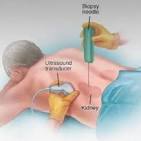Who needs a kidney biopsy?
 How a kidney biopsy is done
How a kidney biopsy is done
Most people with kidney disease do not need a kidney biopsy. It is an unusual investigation. They are organised by a hospital kidney doctor called a nephrologist.
A kidney biopsy is recommended for certain kidney problems. These are the 5 indications for a kidney biopsy:
- Acute Kidney Injury (AKI) of unknown cause (and 2 normal sized kidneys)
- Chronic Kidney Disease (CKD) of unknown cause (and 2 normal sized kidneys)
- Blood in the urine (haematuria; that you can see or not) and a ‘surgical’ cause (e.g. kidney cancer or stone) has been ruled out – not all cases need one
- Protein in the urine (proteinuria) – if your urinary Albumin-to-Creatinine Ratio (ACR) is > 30 mg/mmol (normal is <3). If ACR > 100, most (no-diabetic) patients will require a kidney biopsy that your nephrologist will organise. Severe proteinuria is called Nephrotic Syndrome (when ACR > 220). Almost all (non-diabetic) patients with nephrotic syndrome, need a kidney biopsy
- Monitoring kidney transplant function or rejection.
Note. 2, 3 and 4 are often due to a glomerulonephritis, vasculitis, or interstitial nephritis; which may respond to strong drugs that can suppress your immune system (immunosuppression). This is why its so important to get a biopsy in these cases.
Your doctor will determine if a kidney biopsy is necessary based on your individual situation and medical history.
Who doesn’t need a kidney biopsy?
- If you have had diabetes (Type 1 or 2) for 10 years or more, and have significant proteinuria (ACR > 50). In this situation the cause is almost always the diabetes (called diabetic nephropathy)
- If you are suspected of having a kidney cancer. Why? There is a concern that a biopsy can spread the cancer
- Children (say, under 14 years) with nephrotic syndrome. They almost always have minimal change nephropathy (MCN) and can be treated as such.

